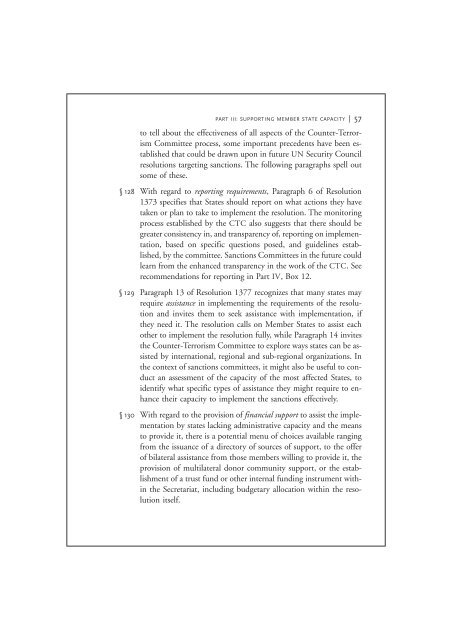Making Targeted Sanctions Effective - Small Arms Survey
Making Targeted Sanctions Effective - Small Arms Survey
Making Targeted Sanctions Effective - Small Arms Survey
Create successful ePaper yourself
Turn your PDF publications into a flip-book with our unique Google optimized e-Paper software.
§ 128<br />
§ 129<br />
§ 130<br />
PART III: SUPPORTING MEMBER STATE CAPACITY | 57<br />
to tell about the effectiveness of all aspects of the Counter-Terrorism<br />
Committee process, some important precedents have been established<br />
that could be drawn upon in future UN Security Council<br />
resolutions targeting sanctions. The following paragraphs spell out<br />
some of these.<br />
With regard to reporting requirements, Paragraph 6 of Resolution<br />
1373 specifies that States should report on what actions they have<br />
taken or plan to take to implement the resolution. The monitoring<br />
process established by the CTC also suggests that there should be<br />
greater consistency in, and transparency of, reporting on implementation,<br />
based on specific questions posed, and guidelines established,<br />
by the committee. <strong>Sanctions</strong> Committees in the future could<br />
learn from the enhanced transparency in the work of the CTC. See<br />
recommendations for reporting in Part IV, Box 12.<br />
Paragraph 13 of Resolution 1377 recognizes that many states may<br />
require assistance in implementing the requirements of the resolution<br />
and invites them to seek assistance with implementation, if<br />
they need it. The resolution calls on Member States to assist each<br />
other to implement the resolution fully, while Paragraph 14 invites<br />
the Counter-Terrorism Committee to explore ways states can be assisted<br />
by international, regional and sub-regional organizations. In<br />
the context of sanctions committees, it might also be useful to conduct<br />
an assessment of the capacity of the most affected States, to<br />
identify what specific types of assistance they might require to enhance<br />
their capacity to implement the sanctions effectively.<br />
With regard to the provision of financial support to assist the implementation<br />
by states lacking administrative capacity and the means<br />
to provide it, there is a potential menu of choices available ranging<br />
from the issuance of a directory of sources of support, to the offer<br />
of bilateral assistance from those members willing to provide it, the<br />
provision of multilateral donor community support, or the establishment<br />
of a trust fund or other internal funding instrument within<br />
the Secretariat, including budgetary allocation within the resolution<br />
itself.
















